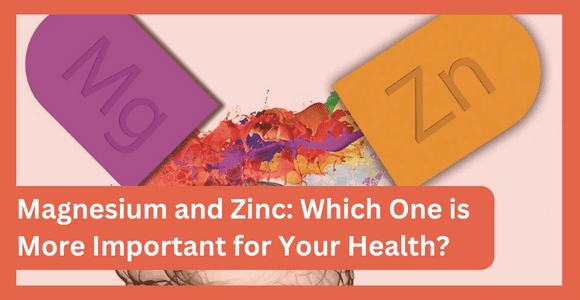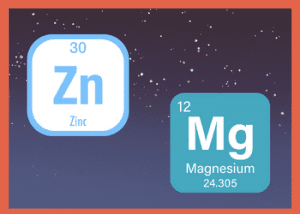Magnesium and zinc are essential minerals that play a critical role in sustaining our well-being. They can help us regulate muscle movement, and nerve activity, and even support cardiac health – making them an indispensable part of staying healthy.
Magnesium and zinc offer a wide range of advantages, however, they vary in the particular roles they play and how they contribute to our overall well-being. To gain a greater understanding of these two important elements, let’s dive deep into their similarities as well as distinctions – so you can decide which one serves your health best.
Table of Contents
Should You Take Magnesium and Zinc Together?
All nutrients are interconnected in some capacity. They can be complementary, augmenting and improving one another’s absorption rate, or they might not cooperate at all, battling to be absorbed first. They are two special minerals that work together when taken with precise dosages.
 According to board-certified cardiologist Vimal Ramjee, M.D., these minerals are regularly combined due to their complementary advantages. If you ever come across a “ZMA” supplement – zinc, magnesium, and B6 – this is why.
According to board-certified cardiologist Vimal Ramjee, M.D., these minerals are regularly combined due to their complementary advantages. If you ever come across a “ZMA” supplement – zinc, magnesium, and B6 – this is why.
Do you think that your levels of zinc or magnesium may be off? Combining the two supplements, or even taking them on the same day, can bring your body back to its optimal functioning.
Zinc and magnesium are important minerals that offer a range of health benefits. Zinc has been linked to increased testosterone levels in men, which may have benefits for muscle building and overall health.
Magnesium, on the other hand, is known to promote relaxation and aid in sleep, making it a great supplement to take before bed. Additionally, both minerals have been studied for their potential benefits in conditions such as PCOS, and zinc has been found to be important for sperm health in men.
Food Sources of Magnesium and Zinc
It’s essential to remember that the quantity of magnesium and zinc in these foods can fluctuate depending on various components like soil conditions, farming methods, and processing procedures.
Magnesium:
- Dark leafy greens such as spinach, kale, and Swiss chard
- Nuts and seeds such as almonds, cashews, and pumpkin seeds
- Whole grains such as brown rice, quinoa, and whole wheat bread
- Legumes such as black beans, chickpeas, and lentils
- Avocado
- Bananas
- Dark chocolate
Zinc:
- Shellfish such as oysters, crabs, and mussels
- Meat such as beef, pork, and chicken
- Nuts and seeds such as cashews, pumpkin seeds, and sesame seeds
- Whole grains such as wheat germ and quinoa
- Dairy products such as cheese and yogurt
- Beans such as chickpeas and kidney beans
- Dark chocolate
Furthermore, certain conditions or medications may make it difficult for some people to absorb these minerals from their diet. Taking supplements could be appropriate in such a case to guarantee a sufficient intake of magnesium and zinc. If you have any worries about your magnesium or zinc levels, reach out to an experienced healthcare professional right away.
Benefits
It is essential to remember that the advantages of magnesium and zinc are dependent on individual factors such as age, gender, and overall health. Also, taking large amounts of these minerals in supplement form may not offer the same benefits derived from a balanced diet and could even cause adverse effects.
| Mineral | Benefits |
|---|---|
| Mg | Helps regulate muscle and nerve function |
| Promotes relaxation and aids in sleep | |
| Regulates blood pressure and supports heart health | |
| May help prevent or manage type 2 diabetes | |
| Supports the healthy bone formation and prevents osteoporosis | |
| May reduce symptoms of anxiety and depression | |
| Zn | Supports immune function and helps fight off infections |
| Plays a role in wound healing and tissue repair | |
| Helps regulate hormone levels, including testosterone | |
| May improve fertility and sperm quality in men | |
| May reduce inflammation and oxidative stress | |
| May improve symptoms of acne and other skin conditions |
Before beginning any new supplements, it’s best to consult with your physician first – especially if you have an existing medical condition or are consuming other medications.
Side Effects
It’s critical to remember that the possibility and seriousness of side effects can differ depending on your age, gender, as well as overall health.
Additionally, consuming substantial amounts of zinc or magnesium supplements can lead to unwanted consequences – thus it is essential you adhere to the prescribed daily intake levels and consult a doctor before beginning any new supplement regimen; this is especially true if you are taking medications or possess medical conditions.
| Mineral | Potential Side Effects |
|---|---|
| Zn | Nausea and vomiting |
| Diarrhea | |
| Stomach cramps | |
| Headache | |
| Loss of appetite | |
| Metallic taste in the mouth | |
| Copper deficiency (with high doses) | |
| Reduced immune function (with high doses) | |
| Interference with antibiotics (with high doses) | |
| Mg | Diarrhea |
| Nausea and vomiting | |
| Stomach cramps | |
| Headache | |
| Fatigue | |
| Muscle weakness | |
| Reduced heart rate (with high doses) | |
| Interference with certain medications (with high doses) |
If you are uncertain about the need to supplement with zinc or magnesium, it’s best to discuss your options with a healthcare professional.
For some people, dietary intake is sufficient and additional supplementation may not be necessary. However, certain medical conditions can interfere with supplementation and should be taken into account before starting any new regimen.
Dosage and Usage. When Should I Take Zinc and Magnesium?
Zinc is also involved in the metabolism of carbohydrates, proteins, and fats. The recommended daily allowance (RDA) for zinc varies depending on age and gender. Here are some general guidelines:
- Infants (0-6 months): 2 mg
- Infants (7-12 months): 3 mg
- Children (1-3 years): 3 mg
- Children (4-8 years): 5 mg
- Children (9-13 years): 8 mg
- Adolescents (14-18 years): 11 mg (males) and 9 mg (females)
- Adults (19+ years): 11 mg (males) and 8 mg (females)
- Pregnant women: 11-12 mg
- Breastfeeding women: 12-13 mg
Ultimately, calcium and magnesium are best absorbed when taken during the evening with food or before bedtime. It’s most efficient to consume zinc separately from iron and apart from calcium, so taking it slightly before meals are recommended.
Magnesium is an essential mineral that is involved in numerous bodily processes. It plays a role in muscle and nerve function, energy production, and bone health.
The recommended daily allowance (RDA) for magnesium varies depending on age and gender. Here are some general guidelines:
- Infants (0-6 months): 30 mg
- Infants (7-12 months): 75 mg
- Children (1-3 years): 80 mg
- Children (4-8 years): 130 mg
- Children (9-13 years): 240 mg
- Adolescents (14-18 years): 410 mg (males) and 360 mg (females)
- Adults (19-30 years): 400 mg (males) and 310 mg (females)
- Adults (31+ years): 420 mg (males) and 320 mg (females)
- Pregnant women: 350-400 mg
- Breastfeeding women: 310-360 mg
If you are magnesium deficient or in danger of becoming so, your doctor will likely suggest that a magnesium supplement be taken. The precise dosage for this supplement is subject to the individual’s age, gender, and overall well-being.
It’s essential to ensure that you don’t consume more than the recommended daily dose of magnesium – too much can be hazardous. The tolerable upper intake level (UL) for magnesium is 350 mg per day from dietary supplements. Exceeding this dosage could lead to undesired health effects, so always adhere to the UL when taking any type of supplement containing magnesium.
Detecting Zinc Deficiency
Since Zn is found in small amounts throughout our bodies, it can be difficult to detect a deficiency by conducting a routine blood test. To get an accurate reading of your Zn levels, you’ll need to have samples from either your plasma, urine, or hair analyzed.
Your doctor will also take into consideration other factors such as diet and family history when determining if supplements are necessary for you.
If you’re looking for an easier way to figure out what your zinc levels are, why not invest in a home-testing kit? All it takes is a single hair sample that you send off to receive more detailed results. In only a few days, the answer will be clear: how much zinc should be added to your diet?
Frequently Asked Questions
Can I Take Zinc and Magnesium Everyday?
Yes, you can take zinc and magnesium every day, but it’s important to make sure you don’t exceed the recommended daily intake levels.
Why Do You Take Zinc and Magnesium at Night?
The Journal of American Geriatrics Society has highlighted that Zinc, Melatonin, and Magnesium can serve as a powerful combination to promote better sleep among those suffering from insomnia.
Incorporating zinc supplements into your evening routine is especially advantageous in multiple ways.
What are 3 Deficiency Symptoms of Magnesium?
Deficiency in magnesium can manifest through various symptoms, impacting multiple systems within the body.
Muscle Cramps and Spasms: One common symptom of magnesium deficiency is muscle cramps and spasms. Magnesium plays a crucial role in muscle function, including muscle contraction and relaxation. Insufficient magnesium levels can lead to hyperexcitability of nerves and muscles, resulting in involuntary contractions, cramps, and spasms. These cramps often occur in the calves, feet, or hands and may worsen during physical activity or at night.
Fatigue and Weakness: Inadequate magnesium levels can contribute to feelings of fatigue and weakness. Magnesium is involved in energy metabolism, where it participates in the production and utilization of ATP (adenosine triphosphate), the body’s primary energy currency. Low magnesium levels can impair ATP synthesis, leading to reduced energy levels and increased feelings of tiredness and weakness.
Irregular Heartbeat (Arrhythmia): Magnesium deficiency can affect the heart’s electrical activity, potentially leading to irregular heartbeats or arrhythmias. Magnesium plays a vital role in maintaining the balance of electrolytes, such as potassium and calcium, which are essential for normal heart function. Insufficient magnesium levels can disrupt this balance, causing abnormal heart rhythms, palpitations, or even more severe cardiovascular complications.
It’s important to note that magnesium deficiency can also present with a range of other symptoms, including nausea, vomiting, numbness, tingling, and mood disturbances. If you suspect you may have a magnesium deficiency, it’s advisable to consult with a healthcare professional for proper evaluation and management.
What Does a Lack of Zinc Cause?
A lack of zinc in the body can lead to various symptoms and health issues, affecting multiple systems:
- Impaired Immune Function: Zinc is essential for maintaining a healthy immune system. A deficiency in zinc can weaken the immune response, making individuals more susceptible to infections, illnesses, and prolonged recovery times. This is because zinc is involved in the development and function of immune cells, including T cells, which play a crucial role in combating pathogens.
- Delayed Wound Healing: Zinc is necessary for proper wound healing and tissue repair. A lack of zinc can impair the body’s ability to form new tissue, leading to delayed wound healing and increased risk of infections. Zinc is involved in various stages of the healing process, including inflammation, collagen synthesis, and immune cell function, making it indispensable for efficient wound repair.
- Growth and Developmental Issues: Zinc plays a critical role in growth, development, and reproduction. Inadequate zinc intake can hinder normal growth in children and adolescents, leading to stunted growth and delayed sexual maturation. Furthermore, zinc deficiency during pregnancy can increase the risk of complications such as low birth weight, preterm birth, and congenital abnormalities in newborns.
Other symptoms of zinc deficiency may include loss of appetite, hair loss, skin problems (such as dermatitis), impaired taste or smell, and mental lethargy. It’s essential to address zinc deficiency promptly through dietary changes or supplementation under the guidance of a healthcare professional to prevent long-term health complications.
Conclusion
Meeting your daily needs of essential minerals such as Magnesium and Zinc is simple when you have a nutrient-rich diet accompanied by dietary supplements. You can find these nutrients in many delicious foods including whole grains, seafood, meat, leafy greens, legumes, nuts, seeds, and dairy.
Nevertheless, it’s typical to experience deficiencies in both vitamins – this is where supplementation becomes indispensable for the majority of individuals. Consume healthily with added supplements so that you can live optimally.
What’s more, taking Zinc and Magnesium together might bring even more advantages. You can choose to take them individually or in a combo of Calcium, Magnesium, and Zinc which works to strengthen bones with the help of Calcium; supports a healthy heart with the aid of Magnesium; and bolsters your immune system’s strength by providing it additional Zinc.
Above all, get your vitamin and mineral levels checked to ensure you are meeting your health goals. Then speak with a doctor or healthcare practitioner to determine which supplements – if any – are suitable for you.

